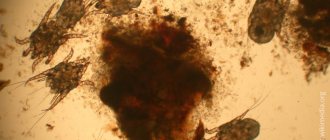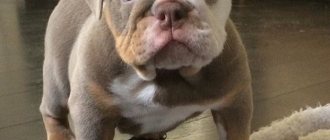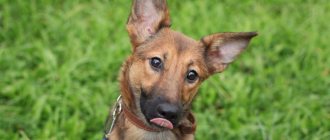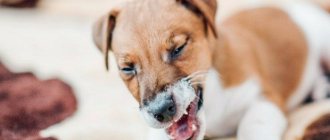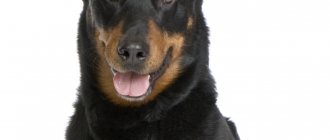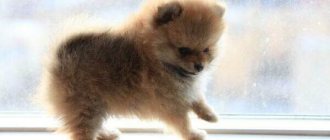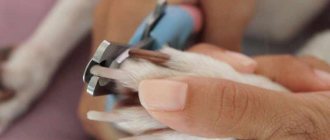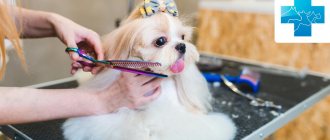When keeping dogs at home, various problems may arise related to the health of the animal and the management of natural needs. It is often believed that urinary incontinence in dogs is limited to older or seriously ill animals. But this is not always fair.
Very young animals also suffer from this disease. Owners need to know what to do if their dog is incontinent and be able to distinguish a true health problem from other situations.
Only a veterinarian with extensive experience knows exactly how to cure urinary incontinence in domestic dogs, so any amateur activity can only do harm. For adequate treatment, it is necessary to have an accurate diagnosis, and it can only be made in a modern veterinary clinic with appropriate high-tech equipment.
Why does a dog urinate at night?
If your dog periodically or constantly urinates at night or relieves himself in the wrong place, to solve this problem, here are the most common causes of uncleanliness:
- Marking the territory. As a rule, dogs, especially males, can crap in houses, marking their territory during the rutting period. This behavior is also possible if another animal or new objects appear in the house. By leaving his marks, the dog thus indicates his social status. And this can be done not only during the day, but also at night, when the owners are sleeping and cannot scold the pet.
- Insufficient walk in the evening. You need to walk your dog several times a day, morning and evening. The minimum walking time is 30-40 minutes. One of the walks should take at least 1.5-2 hours. Walking time depends on the dog’s physiology, age, health, and weather conditions. At the same time, during a walk, the pet should not only run and frolic with its relatives, but also go to the toilet.
- To attract attention . Cynologists and animal psychologists explain a dog's uncleanliness by saying that the dog does not receive enough attention from its owners and thus attracts attention.
- Phobias, fears, stress. A dog may urinate at night due to simple fear, under the influence of any strong stimuli (fireworks, firecrackers, thunderstorms). Uncleanliness can be caused by the fact that the dog has suffered severe stress and emotional arousal.
- Health problems. This is one of the most common reasons why dogs pee at night, during sleep or during the day. Cystitis, urolithiasis, inflammatory processes, acute and chronic renal failure are diseases that explain your dog’s uncleanliness.
- Rough treatment. If you constantly shout, hit your dog, or use physical violence in the process of training, do not be surprised that puddles or piles will appear in the house from time to time.
- Problems in education. Perhaps the owner made mistakes in training the dog or the dog is simply spoiled.
Treatment of urinary incontinence in dogs
Depending on the diagnosis, the four-legged patient is prescribed special medications or undergoes surgery. The existing diet and care are being reviewed in favor of medicinal feed and more thorough genital hygiene.
Drug therapy
If there is an infection, antibiotic therapy is used, and if stones are detected, a special diet is used to dissolve urinary stones by alkalizing or oxidizing the urine. The choice of dry food will depend on the type of formations found.
For age-related urinary incontinence in dogs, medications are prescribed that increase the tone of the smooth muscles of the sphincter. As an alternative, estrogen hormone therapy is used.
Nervous disorders are treated with sedatives. They stabilize the psycho-emotional state and help reduce anxiety in tense situations.
When is surgery indicated?
Surgery is used for congenital anomalies, postoperative complications, injuries and large formations in the bladder. Depending on the situation, the surgeon changes the position of the ureter, restores muscle tone with collagen injections, eliminates existing nerve compression, or removes stones.
The operation is also indicated for sexual hunting, but only when the animal is not of breeding value. Taking hormonal drugs to suppress instincts is possible, but not recommended. This treatment has many risks, so it is much safer to sign your pet up for castration.
Other causes of uncleanliness in dogs
- At night, puppies and young dogs most often defecate. The puppy simply cannot wait until the morning due to the long time intervals between walks and pees at home. In puppies, the urinary system is not sufficiently developed, so the dog cannot withstand 7-8 hour breaks between walks.
- If a dog pees at night, this behavior may be caused by irregular feeding, increased thirst (the dog drinks a lot of water before bed), or a failure in the daily routine.
- A dog may urinate at night because it is in pain. The cause is most often acute pain syndrome.
- Diabetes mellitus is another reason that explains the uncleanliness of a dog. A dog with diabetes urinates most often at night.
- A dog may urinate at night because the bedding, or the places where the pet has previously urinated, smells of its “marks.”
- If your dog pees at night, the dog may have gotten cold during a walk, or you and your dog have been caught in the rain . This behavior is most often observed during the cold season, especially in dogs with problems with the genitourinary tract.
Diagnostics in a veterinary clinic
If you seek help in a timely manner, the prognosis for urinary incontinence in dogs is favorable. Treatment methods depend on the cause of the disorder, so the four-legged pet will have to undergo a full examination. Diagnosis may include the following studies:
- a general urine and blood test that monitors changes in baseline values;
- bacterial culture, which allows you to select an effective antibiotic to combat an infectious disease;
- vaginal smear to study microflora for bacteria and other pathogens;
- Ultrasound to determine the condition of internal organs;
- X-ray to reveal the presence of injuries.
If the occurrence of the disorder is explained by lack of education, non-pathological polydipsia or excessive emotionality, specific treatment is not applied. The listed situations can be eliminated by training and timely walking.
What to do if your dog pees at night
Determine how often your pet needs to relieve itself. In this case, increase the number of walks and the duration of walks. The duration of short walks should be at least 30 minutes.
- It is useless to scold, beat, or shout at a dog if it pees at night, in its sleep. You need to punish precisely at the moment when you take your pet by surprise.
- If the dog pees at night, feed the dog an hour and a half before the evening walk. In summer, always take drinking water with you when going for walks. After a walk, the dog will feel less thirsty.
- Follow the regime and daily routine. Walk your dog at the same time every day. Make sure that during the walk the dog fulfills all its physiological needs.
- If your dog frequently urinates at home at night, take him outside for a few minutes to sleep.
- Keep your house clean. Even if the dog has urinated in the wrong place in the apartment, thoroughly wash the “crime scenes” with household chemicals.
- Monitor your dog's diet. If an animal is diagnosed with any pathologies, certain foods can affect the functioning of the genitourinary system.
- Make sure that in winter, during the cold period, the dog does not freeze. Shorten the walking time in rainy, damp, windy weather. For small dogs, buy clothes and shoes for dogs.
- If your pet constantly urinates not only at night but also during the day, take the animal to the clinic for an examination.
- Pay as much attention to your pet as possible. The dog should feel your care and love.
If all else fails, consult a dog trainer or animal psychologist. The specialist will recommend a method for correcting this behavior.
Care and hygiene products
If your dog has urinary incontinence, it is necessary to avoid salt. It retains water, increasing pressure on the bladder. They also limit the amount of protein.
In addition to reviewing the diet, you should also take care of the maintenance of the animal. For the pet to recover, it is necessary to protect it from drafts to prevent secondary infection. Place the bed in a quiet and warm room, remembering to keep it clean.
Until the functionality of the sphincter is restored, you will have to use absorbent diapers or diapers. The animal must be washed regularly to prevent the development of a urinary burn. In addition to plain water, you can use alcohol-free sanitary napkins. They can be purchased at a veterinary pharmacy or pet store.
Desire to attract attention
When, in addition to the dog itself, another pet appears in the house (no matter who it is: a parrot, a hamster or a cat), competition arises, because in addition to the dog, attention is now paid to other living creatures. This causes jealousy, which the dog expresses by going to the toilet on the carpet. Thus, when a dog pees at home, it declares itself, marks its territory, trying to attract attention to its “person,” and seeks to show who is boss in the house. This is how the animal wants to protect itself. What solution will be effective in this case? Here you should strengthen the demonstration of your love, care and attention to the pet. It is very important, as soon as a dog’s “competitor” appears in the house, to show the owner that he still loves the dog, and no less than before.
How to distinguish normality from pathology
Bedwetting has various causes. A “psychological problem” or the result of an existing inflammatory disease of the urinary system is likely.
To determine the exact etiology of bedwetting, your veterinarian will recommend a series of tests and tests. Research will reveal the true nature of your pet’s difficulty urinating and select adequate therapy.
First of all, the doctor will prescribe an ultrasound examination of the dog’s kidneys. This type of diagnosis will help identify the presence of inflammatory kidney diseases or pathology of organ formation. Perhaps it will determine the presence of a neoplasm in the pet.
Urine tests are required, which do not give such a clear picture, but allow one to assess the correct functioning of the kidneys.
Using urine tests, it is possible to detect the presence of an infectious process in the urinary tract and kidneys, which cannot be determined by ultrasound.
In addition to the urological examination, it is necessary to evaluate the neurological status of the animal.
Bedwetting is often caused by diseases: cystitis, urolithiasis, diabetes mellitus, malignant neoplasms and benign tissue growths, inflammatory processes in the pelvic organs.
Answer
To understand why a dog begins to urinate during sleep, let’s understand the normal indicators.
Urine formation occurs in the glomeruli of the kidneys. Next, the liquid enters the pyelocaliceal system. Collecting and accumulating in the pelvis, urine gradually flows into the cavity of the bladder.
The cycle is repeated several times per minute. The products of the body's activity accumulate in the cavity of the bladder and are held inside with the help of a powerful sphincter. Due to muscle contraction, fluid is not released out.
A nerve signal comes from the dog's brain, leading to relaxation of the sphincter muscles. Urine flows out through the lumen of the urethra.
As soon as the bladder is empty, the sphincter closes. The urinary system is divided into two sections: the upper level is formed by the glomeruli and tubules and ureters. The lower level forms the bladder and urethra.
Treatment
The first thing to do if your dog is peeing is to make a mental note of any possible changes to his diet or daily routine.
As mentioned above, sometimes a change in food or weather can cause him to drink more water and urinate more as a result.
If you can't think of any lifestyle changes that may have caused your dog to pee, consider the possible causes listed above. Try to look for other symptoms of dog illness that your dog may be exhibiting so you can report them to your veterinarian.
Also, if possible, try collecting a sample of your dog's urine so your veterinarian can do a urine test.
How to prevent urine leakage
Although urinary incontinence cannot be completely prevented, there are steps you can take to help your dog avoid or manage it.
1. Let your dog urinate outside often. An empty bladder is much less likely to leak.
2. Train your dog to sleep and lie down only on easy-to-clean surfaces in the house, or provide waterproof puppy training pads in your dog's favorite places.
3. Consider having your dog wear dog diapers, especially when you are away from home.
4. Clean your dog thoroughly to prevent infection.
Most importantly, don't punish your dog. Keep in mind that this is not the dog's fault, but simply part of aging for many dogs.
This may be inconvenient for you at times, but you know that this is one of those things that you may have to face when you let your furry friend into your life.
Punishment for misconduct
Paradoxically, it is often punishment that can cause an adult dog to pee at home. In Rostov, dog handlers say the following about this: the animal was probably punished for such an offense, and when there is someone at home, it does not allow itself to urinate on the carpet. But when no one is there, the dog sees no need to endure. You can ask, for example, the previous owners of the dog whether there were any incidents and whether “disciplinary measures” were taken. Redoubled attention to the pet with increased monitoring of it will help solve the problem.
The dog pees at home. The reason for this phenomenon is that the owner does not pay attention
Due to being very busy, the dog owner may not provide adequate attention to the pet. For example, if the owner is often delayed at work, the dog becomes bored. Dogs of working and hunting breeds are especially bored. Feelings such as sadness and melancholy lead to uncontrollable relaxation of the animal's bladder muscles. Boredom has a bad effect on a dog's behavior; it doesn't even want to endure it, and this often leads to an adult dog peeing at home. In Rostov-on-Don, dog handlers often cite this very reason for the animal’s inappropriate behavior. Perhaps, before this, a certain routine for walking the dog and emptying the bladder had already been established, and now, when the owner is absent for a long time, a malfunction occurs. This makes the problem even worse. In addition, urination can also be accelerated by the fact that the long-awaited moment of the owner’s arrival causes joy in the dog. This leads to relaxation of the corresponding muscles and causes the dog to urinate right in the house.
What will help in this case? The solution to the problem is very simple. Perhaps the owner will have to reconsider and, if possible, change his work schedule in order to spend more time with his pet. We must remember that this is not a toy bought so that, after playing enough, you will forget about it. Increasing your walking time will be helpful. If you diversify your time with your pet with all kinds of games, there will be no trace of dog boredom! It has been noticed that strict adherence to the dog’s walking routine quickly normalizes the frequency of going to the toilet, and the animal stops urinating on the carpet.
Help of chemicals
When a dog begins to leave puddles on the furniture, carpet or floor, and cannot be retrained, you can use specially developed means for toilet training the animal. They are available in almost any pet store.
It is advisable to use them in combination:
- Deterrent drugs. Problem areas are treated, the smell of the products does not allow the puppy to get closer, and therefore protects from unwanted puddles. Simple table vinegar has the same property. It’s important not to overdo it here—pure essence can destroy a dog’s sense of smell. Mix a few drops of the product in water and wipe the desired surface.
- Attractive drugs (powders, sprays, wipes). They are added to the tray filler, dogs like the smell - they relieve themselves in the right place.
As a last resort, you can use special absorbent wipes. Place them around the perimeter and throw them away after use.
Training a Dog to Stop Submissive Urination
As your dog ages, he will outgrow the urge to urinate submissively. Training dogs at a young age can help them learn faster.
Dogs usually cower or drop to their feet when they feel the urge to submissively urinate.
They can also:
- Raise your front paws
- Press your tail
- Press your ears back
- Lick
If you notice your dog acting this way, redirect his attention immediately.
